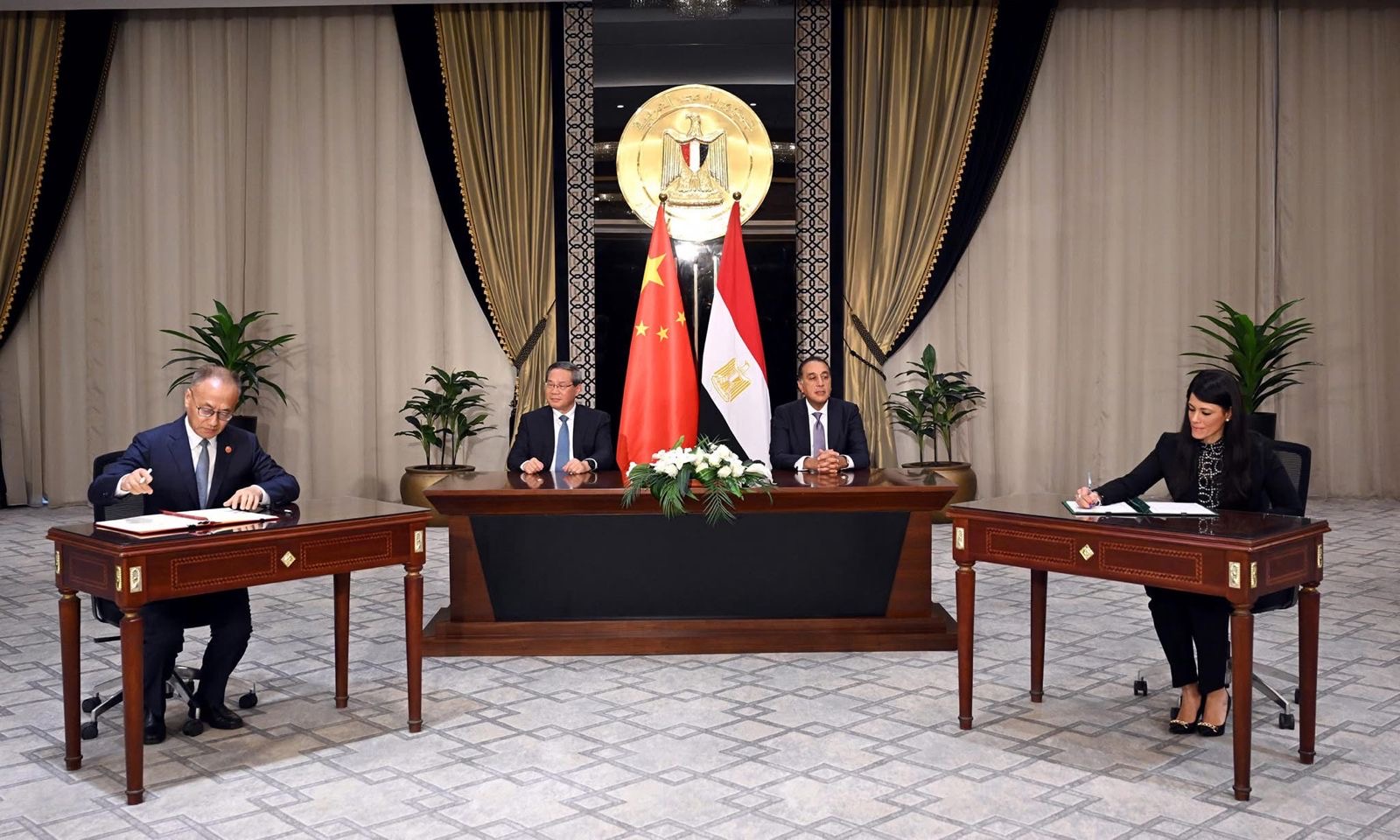• The Two Countries Sign Grants for the Prosthetics System Development Project and the Biosafety Laboratory Project, and Advance Cooperation in Human Resources Development
• Al-Mashat: New Documents are an Extension of the Comprehensive Strategic Partnership Between the Two Countries and Open Further Avenues for Cooperation
• Localization of Industry, Digital Economy, and Education Top the Cooperation Sectors Within the First Development Cooperation Strategy Between the Two Countries
During the historical visit of H.E. Mr. Li Qiang, Premier of the State Council of China, to the Arab Republic of Egypt, H.E. Dr. Rania A. Al-Mashat, Minister of Planning, Economic Development and International Cooperation, and H.E. Mr. Chen Xiaodong, Chairman of the China International Development Cooperation Agency (CIDCA) of the People's Republic of China, signed 5 new cooperation documents that will boost Egyptian-Chinese strategic relations.
These include a Memorandum of Understanding for the first development cooperation strategy between the two countries for 2025/2029, and the first phase of the debt-for-development swap program.
The documents were signed at the Cabinet headquarters in the New Administrative Capital. The signing was witnessed by H.E. Dr. Mostafa Madbouly, Prime Minister of Egypt, and H.E. Mr. Li Qiang, Premier of the State Council of China.
H.E. Dr. Rania Al-Mashat emphasized that the visit of the Premier of the State Council of China to the Arab Republic of Egypt, and his meetings with H.E. President Abdel Fattah El-Sisi, President of the Republic, and H.E. Dr. Mostafa Madbouly, Prime Minister, reflect the continuous progress of bilateral relations between the two countries over the past years. This also implements the comprehensive strategic partnership agreement signed by the presidents of the two countries in 2014.
H.E. Dr. Al-Mashat pointed out that the signed documents represent a boost and strategic progress in joint relations by establishing the first development cooperation strategy for the next five years, and signing the framework agreement for the first debt swap agreement between the two countries.
H.E. Minister Al-Mashat stressed that the development of Egyptian-Chinese relations embodies the effective role of Egypt's economic diplomacy, which works to develop and strengthen economic relations with international institutions and development partners, based on the balanced political relations established by the country's political leadership.
She noted that the historical partnership between the two countries is not limited to development cooperation but also diversifies into multiple fields, foremost among them are the localization of industry and technology, and joint investments.
Furthermore, the international Belt and Road Initiative serves as a tool for achieving economic integration between Egypt, China, and partner countries in the initiative, and for promoting shared economic development.
First Development Cooperation Strategy Between the Two Countries
The two sides signed an MoU on the first development cooperation strategy between Egypt and China from 2025-2029. This aims to promote development cooperation between the two countries in line with Egypt's National Development Strategy 2030 and the Global Development Initiative (GDI).
The MoU stipulates enhancing cooperation in priority areas for both sides, including healthcare, connectivity, climate change and green development, digital economy, space, education, and industrial localization, which will serve as an opportunity for joint initiatives, as well as any other areas that the two sides may agree upon during this period.
The strategy also encourages exploration of additional projects that align with the GDI and Egypt Vision 2030, including those that promote green transformation and industrial localization.
This initiative builds upon the MoU signed by Dr. Al-Mashat during her participation in the GDI meetings in July 2023.
First Debt Swap Agreement
In another context, the two parties signed the framework agreement for the first phase of a Debt Swap for Development Program, activating an MoU originally signed in October 2023. Egypt is the first country with which CIDCA has entered into this kind of development financing agreement.
H.E. Dr. Al-Mashat highlighted that Egypt has significant experience and success in debt swap mechanisms, especially with Italy and Germany, with over $900 million in such programs.
She added that Egypt has well-established governance models for maximizing the impact of these programs, aligning with global calls to use debt swaps as innovative tools for reforming the global financial system and achieving development goals in the Global South.
Development of the Prosthetics System
H.E. Dr. Rania Al-Mashat also signed the exchange of letters for a feasibility study grant for the national project to develop the prosthetics system, amounting to 1,520,000 Chinese Yuan.
This project aims to make Egypt a regional hub in the Middle East and Africa for providing prosthetic limbs and assistive devices for people with disabilities, as well as possessing the manufacturing capability for them according to internationally approved standard specifications.
Human Resources Development
H.E. Minister Al-Mashat, and the Chairman of CIDCA, also signed an MoU on strengthening cooperation in human resources development, complementing the Ministry's role as a national coordinator for the annual training program provided by the Chinese side to the Egyptian government.
The MoU includes several provisions to enhance cooperation between the two sides in the field of human resources development.
Through this, the Chinese side will provide (2000) training opportunities for Egypt in bilateral and multilateral training programs during the period from 2025-2027.
Biosafety Laboratory
The two sides also signed exchange of letters for the grant for the establishment of a Level-3 Biosafety Laboratory.
This project aims to strengthen Egypt’s capabilities in the field of biosafety through the establishment of a Level-3 Biosafety Laboratory, which will provide a secure environment for research, diagnosis, and the development of control measures for highly hazardous pathogens that require strict containment procedures, such as highly infectious viruses like COVID-19 and its variants.
